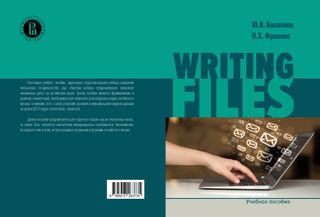?
Writing Files
Writing and publishing in good academic English has become a critical task and an integral part of contemporary university life.
The given compellation of the materials is the reaction the numerous students’ enquiries on rules and techniques of English writing. Our desire was to list the guidelines and outline the key stages of writing process of paragraphs, essays, reviews, letters, memos, minutes, faxes, CVs, reports and articles. The hope of the authors was to enrich the understanding of English writing rules and formats in order to equip all the writers, businessmen, scholars, students, trainers with the reliable information and effective tools of writing.
It is recommended to use the materials of all the units, each containing the tips, writing strategies, samples and exercises, according to the requirements of the target group and educational environment.
